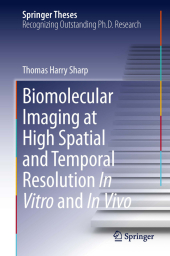 Neuerscheinungen 2013Stand: 2020-01-07 |
Schnellsuche
ISBN/Stichwort/Autor
|
Herderstraße 10
10625 Berlin
Tel.: 030 315 714 16
Fax 030 315 714 14
info@buchspektrum.de |

Thomas H. Sharp
Biomolecular Imaging at High Spatial and Temporal Resolution In Vitro and In Vivo
2014. 2013. xviii, 150 S. 30 SW-Abb., 55 Farbabb. 235 mm
Verlag/Jahr: SPRINGER, BERLIN; SPRINGER INTERNATIONAL PUBLISHING 2013
ISBN: 3-319-02158-3 (3319021583)
Neue ISBN: 978-3-319-02158-4 (9783319021584)
Preis und Lieferzeit: Bitte klicken
With concise coverage of light- and electron-based microscopy, including new cryoelectron techniques, this readily consultable guide allows researchers to make informed decisions on which technique to use, and shows them how to interpret the resulting imagery.
As part of a collaboration between two different groups in chemistry and biochemistry, Thom Sharp presents here his thesis work on the development of new methods for cryoelectron microscopy. Throughout his Ph.D., Thom had to master a whole range of techniques including modelling, molecular biology and microscopy. Using these skills to tackle an outstanding problem, the pursuit of high-resolution structures of peptide-based materials, Thom highlights in this thesis his newly developed methods for analysing and processing this particular type of electron microscopy data. This thesis gives the first molecular description of a de-novo designed peptide-based material. In general, this research will have a huge impact on the peptide assembly field, and also in electron microscopy as it introduces new methods and approaches, all of which are Thom´s inventions and are described in this thesis.
Introduction.- Biomolecules & Microscopy.- Materials and Methods.-Experimental Methods.- Imaging Methods.- Experimental Results.- Towards an Atomistic Structure of a De Novo Designed Peptide Fibre.- Developing Novel Probes for Correlative Light Electron Microscopy.- Conclusions and Appendices.- Concluding Remarks.- Abbreviations.- Amino Acid Structures.- Vectors, Primers and Recipes.
Thom Sharp completed his bachelor´s degree in Biochemistry at the University of Bristol, with a year spent a year working at AstraZeneca. He continued in Bristol for his PhD in bionanotechnology, which was performed under the supervision of Dek Woolfson, a protein design chemist, and Paul Verkade, an electron microscopist. Thom is currently at the University of Oxford, where he is developing DNA-templated protein arrays to increase the throughput of single-particle analysis.


